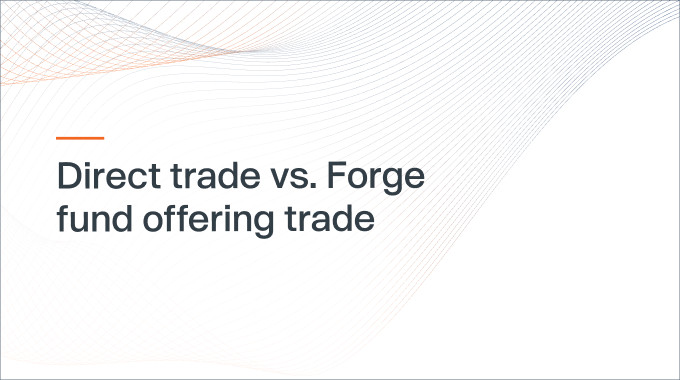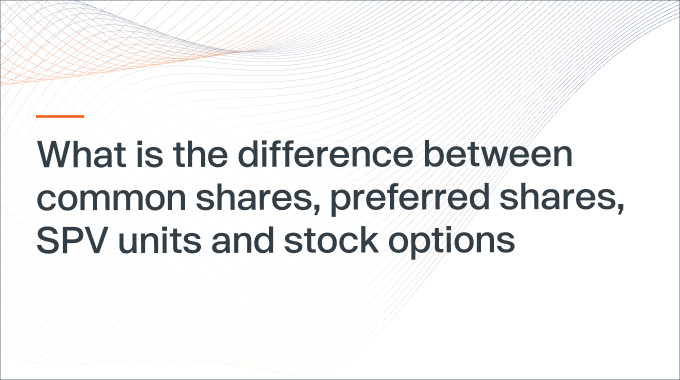Accredited investors, qualified clients and qualified purchasers: Who can invest?
Investing in the private market can offer exciting opportunities: potential access to early-stage startups and pre-IPO unicorns, as well as alternative asset exposure that is not readily available on public exchanges. But, when investing in the private market, not all opportunities are created equally, nor are they available for all types of investors.
The Security and Exchange Commission (SEC) has defined different investor categories based on financial sophistication and net worth. These categories were created to protect investors against the complex risks associated with investing in securities. Categories such as (i) accredited investors, (ii) qualified clients and (iii) qualified purchasers are more than simple regulatory labels; they are the most common categories of potential investors in non-public investments.
In this overview, each category is examined to answer the following questions: what investments are available in each category? What are the eligibility criteria for each category and why do they matter?
Why do investor categories matter?
When you invest in the public market, it can be relatively easy to invest your money: you can buy stocks, exchange-traded funds (ETFs), mutual funds, etc.—often, rather quickly. However, when you invest in the private market, the potential investment upside comes with additional restrictions not found in the public market.
That's where investor categories play a key role in helping people determine who and where they can invest. Private market investor categories are differentiated from the public market because private market investments are less liquid and more complex. As a result, regulators have created the above-mentioned categories to make sure that only individuals or firms with the necessary financial means and sophistication can access certain private market investments.
1. What is an accredited investor?
According to the SEC, an accredited investor is (a) an individual or entity that meets certain wealth or annual income requirements (b) or holds relevant professional certifications.
All qualified entities—from an individual registered broker to a group of dealers, and even a large investment firm—fall in the category of accredited investor. Apart from these entities, banks, savings and loan companies and family offices can also be accredited investors.
Retirement plans or trusts that have at least $5 million in assets can also be considered accredited investors, so long as they are not solely investing in specific funds.
Individuals may qualify as accredited investors if they meet any of the following wealth, income or financial sophistication criteria:
- A net worth of $1 million, with the exclusion of the value of their primary residence.
- Annual income over $200,000 (individually) or $300,000 (with spouse or spousal equivalent) in each of the prior two years, and a reasonable expectation of the same for the current year.
- Holding a current Series 7, 65, or 82 financial securities license from the Financial Industry Regulatory Authority (FINRA).
Accredited investors can invest directly in the private market and can leverage technology like the Forge platform.
2. What is a qualified client?
A qualified client (QC) is distinct from an accredited investor. QCs must meet specific, high-net worth criteria, which allows them greater access to more investment opportunities than investors with lower net worths and less assets.
The current threshold to be a QC, in effect for individuals since 2021, is a minimum of $1.1 million in assets under management with an investment advisor or at least a net worth of $2.2 million, excluding the individual’s primary residence.
QCs can also include those who meet the SEC’s qualified purchaser threshold, which is generally higher for a QC. QCs can further include knowledgeable employees (another term that is specifically defined by the SEC) of an investment advisor.
Investment advisors can offer QCs specific products tailored to more sophisticated and higher net worth individuals that are not available to other investors. QCs can invest in a broader range of investments than accredited investors, including those that offer performance-based compensation. This includes private equity funds, hedge funds, and other alternative investments.
Specifically, a QC can invest in both 3(c)(1) and 3(c)(7) funds. Sections 3(c)(1) and 3(c)(7) of the Investment Company Act of 1940 allow private investment funds to be excluded from SEC registration and regulation as investment companies. Such private funds don’t face the same strict disclosure and compliance requirements as registered funds, but there are limitations around the number and types of investors that can participate. For example, a 3(c)(1) fund is exempt from registration under the Investment Company Act of 1940 if it has 100 or fewer beneficial owners. A 3(c)(7) fund can have up to 2000 beneficial owners and still be exempt from registering as an investment company.
3. What is a qualified purchaser?
A qualified purchaser (QP) is an individual or entity that can invest in securities or investment products, such as venture capital funds or private funds, because they meet specific sophistication thresholds set by the Investment Company Act of 1940.
The criteria to be classified as a QP can differ depending on whether you’re an individual, trust, other entity type, or investment manager. The requirements also vary depending on the type of security or investment product you’re purchasing.
QPs are a more exclusive category of investors than accredited investors and QCs. Although QPs, QCs and accredited investors can both invest in private funds and companies, they are not the same.
A QP must satisfy a higher bar. These QP categories can range from $5 million to $100+ million in owned or managed investments. These are the specific requirements:
- An individual with >$5 million
- A family or estate planning entity with >$5M
- An investment manager with >$25M
- A qualified institutional buyer under Rule 144A with >$100 million
Accredited investors and QCs are also typically not allowed to invest in 3(c)(7) funds. 3(c)(7) funds are limited to QPs but can have up to 2,000 qualified purchaser investors, unlike 3(c)(1) funds, which can only have up to 100 beneficial owners (i.e., ultimate owners when looking through to the ownership of its investors).
Understanding the distinctions between accredited investors, QCs, and QPs is more than just a regulatory exercise—it’s key for navigating the modern private market landscape. These categories not only shape what a person can invest in, but also reflect the level of risk, complexity, and opportunity available. Knowing where one falls within these investor categories is a critical first step to investing wisely in the private market. And, with platforms like Forge, the path to participating in the private market has never been more accessible.



